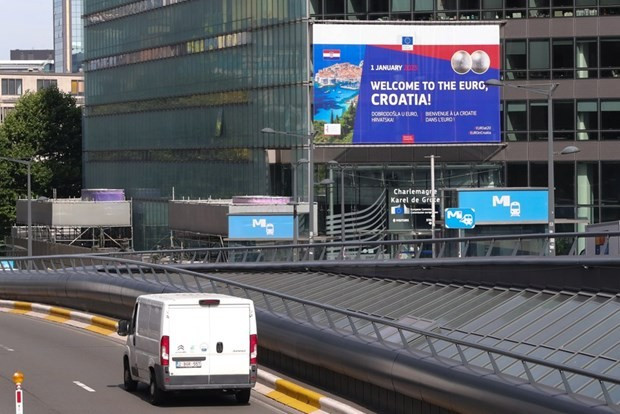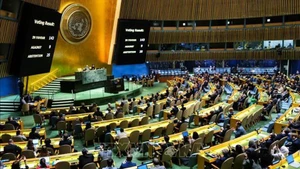During a visit to Croatia on the occasion of the Balkanstate becoming the 20th official member of the Eurozone, European Commission (EC) President Ursula von der Leyen hailed this event as a great achievement for the youngest member of the EU. In addition to bidding farewell to its currency, the kuna, to switch to euro, Croatia also joined the Schengen, the world's largest free movement area. Leyen said this was a proud moment for both the EU and Croatia. Meanwhile, French President Emmanuel Macron expressed his belief that Croatia's accession will make the Eurozone stronger.
Croatia's official membership of the Eurozone coincided with the 10th anniversary of its accession to the EU in 2013. Emphasising that joining the Eurozone and Schengen are two strategic goals to help Croatia integrate more deeply into the EU. Prime Minister Andrej Plenkovic called this a historic event. To become a member of the Eurozone, the country which is located at the crossroads of Central and Southeast Europe, had to meet strict conditions regarding the state of public finances, long-term interest rates, price stability and exchange rates.
Prime Minister Plenkovic affirmed that Croatia has worked hard to pursue this plan for a long time with the firm belief that joining the Eurozone will open up many new opportunities and strengthen its development.
According to EC President Leyen, becoming a member of the Eurozone helps strengthen the economy and brings many benefits to Croatian people and businesses.Accordingly, the introduction of the euro into the financial system will limit currency risks, reduce interest rates, improve Croatia's credit rating and pave the way for more investment. Above all, the euro is considered a strong currency that has been chosen by more and more countries to reserve, second only to the dollars.
In the face of rising inflation and geopolitical tensions that are shaking Europe, Ana Sabic, an expert at the National Bank of Croatia, stressed that the euros have brought the development to the economy and helped stabilise financial market in this country. Croatian National Bank Governor Boris Vujicic noted that the use of the euro will make Croatia a more attractive and safer investment destination for foreign investors in times of crisis. Therefore, it will create the concrete, direct and long-term benefits for Croatian citizens and businesses.
Tourism has been arguably the biggest beneficiary of Croatia's accession to the Eurozone and Schengen. With the attraction of millions of visitors each year, the smokeless industry has become Croatia's key economic sector, accounting for about 20% of the country's gross domestic product (GDP). According to Professor LjuboJurcic at the University of Zagreb, most tourists to Croatia come from Schengen countries such as Germany, Austria and Slovenia. Therefore, joining the Schengen area, which allows about 420 million people to move freely, will boost Croatia's tourism industry strongly in the near future.
For the EU in general and the Eurozone in particular, the decision to add Croatia to the Eurozone has sent a message affirming the solidarity among the member states, especially when the EU is facing many difficulties. Analysts said that over the past years, headwinds from inflation storms, food and energy crises, and conflict in Ukraine have threatened to shake the internal unity of the EU.
In this context, the continued expansion not only shows that the Eurozone continues to retain its attractiveness and important role but also helps member states strengthen confidence in the common development of the bloc and uphold the spirit of unity and mutual assistance to overcome the current difficult period.
Besides the new opportunities, there are still many challenges Croatia needs to overcome when joining the Eurozone and Schengen, including the problem of managing the illegal migrants and the increased risk of crime. However, as the EC President Leyen affirmed, a new chapter has opened and Croatia needs to seize the opportunity to make its economy grow stronger.
















